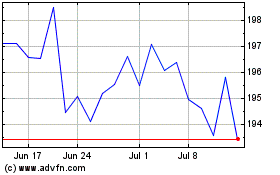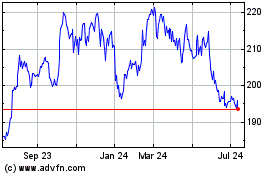UPDATE: Shared Oversight Of Derivatives Market 'A Mistake' -Survey
May 25 2010 - 12:26PM
Dow Jones News
Market participants remain wary of plans by U.S. regulators to
share supervision of the over-the-counter derivatives market, with
a new survey citing divergent practices pursued by stock and
futures agencies.
Nearly 60% of asset managers, broker-dealers and clearinghouses
said that joint custody of swaps markets would be "a mistake"
because of long-standing differences in the oversight approach of
the Securities and Exchange Commission and the Commodity Futures
Trading Commission.
The U.S. Senate and House of Representatives both have passed
financial regulation bills containing a slate of new rules for the
$615 trillion over-the-counter derivatives market, with oversight
shared between the two agencies depending upon product type.
The survey, conducted by Bank of New York Mellon Corp. (BK) and
consultancy Tabb Group, identified a consensus about the regulatory
and legislative fixes aimed at off-exchange derivatives trade,
which has shouldered blame for deepening the financial crisis in
2008.
OTC derivatives include complex and customized financial
instruments such as credit-default and interest-rate swaps, which
are traded privately between parties as a means to tailor hedges to
specific risks.
The market has been a key profit center for derivatives dealer
banks that arrange the transactions. But the financial crisis
exposed high levels of credit risk tied to the products, which are
now targeted by a raft of overhauls.
However, banks and investors remain apprehensive of still-hazy
boundaries between the two main market regulators, and the
different requirements they may apply to the market, according to
Sam Jacob, managing director at BNY Mellon.
"Not all of that is clear in the minds of many market
participants," Jacob said. He also noted concerns that the two
bodies have not always worked "cohesively" in the past.
The SEC and the CFTC currently split authority over swap
markets, each overseeing derivatives linked to markets they already
regulate.
The CFTC handles interest rate- and commodity-linked swap
products, as well as products tied to broad-based indexes. The SEC
has derivatives linked to single securities, like credit
derivatives linked to specific companies, as well as narrow-based
indexes and bespoke options contracts.
The Federal Reserve has a role as the regulator of derivatives
dealer banks.
Language in the Senate's financial market overhaul package would
also give the Fed jurisdiction over clearinghouses set up to handle
OTC contracts, a provision the House of Representatives' version of
the bill doesn't include. The potentially contentious issue is
among those that must be resolved in a conference committee.
The survey said 79% of market participants agree that central
clearing--the practice of posting collateral to a central
repository to back up trades--will help reduce systemic risk in
over-the-counter markets, even as three-quarters of respondents
acknowledged the move would also reduce profits.
It also highlighted progress already made toward these goals,
with most market participants already implementing recommended
practices ahead of legislation.
Dealers banks have been moving toward central clearing of credit
derivatives since mid-2008, driven in part by pressure from the
Federal Reserve to revise antiquated back-office systems that
relied on faxes and paper records.
The industry has cleared some interest rate-linked products for
a decade through a service offered by London-based LCH.Clearnet
Group Ltd.
-By Jacob Bunge, Dow Jones Newswires; (312) 750 4117;
jacob.bunge@dowjones.com
(Sarah N. Lynch contributed to this article.)
CME (NASDAQ:CME)
Historical Stock Chart
From Jun 2024 to Jul 2024

CME (NASDAQ:CME)
Historical Stock Chart
From Jul 2023 to Jul 2024
